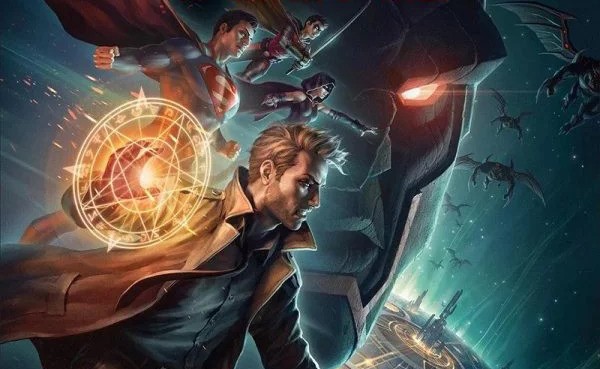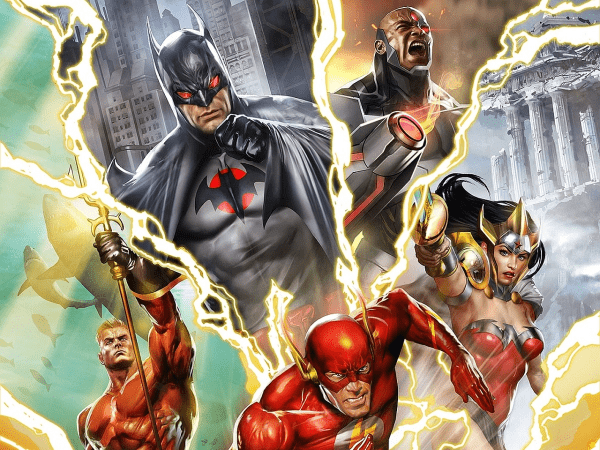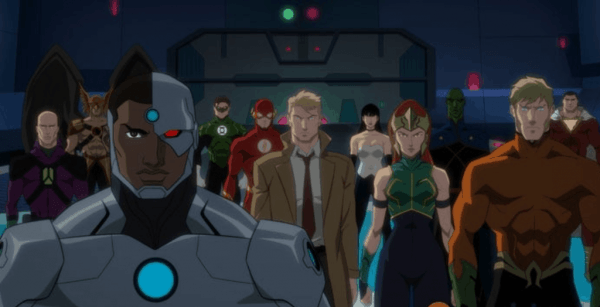Hasitha Fernando chats with composer Frederik Wiedmann…
2020’s Justice League Dark: Apokolips War marks the culmination of the vast shared universe initiative kick-started by DC animation with Justice League: The Flashpoint Paradox. As one of the chief creative voices of this ambitious project, Emmy award-winning film composer Frederik Wiedmann’s contribution to these films are unparalleled. From a musical perspective his scores to these films form a consistent connective-tissue that bridge individual narratives and link all the disparate comic-book characters with one another. In this interview with Flickering Myth the uber-talented composer reflects on his musical journey thus far, and speaks on future projects in the pipeline briefly.
How did you get introduced into the world of music?
I grew up listening to quite a lot of classical music because of my father. He was quite passionate about music, even playing the piano as a hobby. Because of this I fell in love with the violin at an early age. After studying the instrument for almost eight years straight, I decided to next take up playing guitar. While I was never a virtuoso on the violin, it certainly functioned as a great introduction to music in general, in addition to being a stepping stone of sorts, into the world of music.
When did you realize that composing film music was what you wanted to pursue as a career?
After about two years of studying rock guitar, my guitar teacher one day asked me if I’d be interested in looking at some jazz with him. Once he introduced me to the key concepts and theoretical aspects of jazz, I was immediately hooked. From that point on I was virtually unstoppable! I wanted to know more and more about jazz, and I got my hands on pretty much all available jazz harmony books out there, which in the end sparked my love for composing music. Having already been a film music geek so to speak, merging the two was only natural. I think I was about 15 years old when I became very passionate about film music composition, and after getting to know a local film composer in my little town in Germany, my path was set.
Before going solo, you have assisted veteran film composer John Frizzell on various projects in the past. How has working with him influenced your efforts, and what would you say is your favourite memory working with him?
Working with John was by far one of the best schools in the craft that I could have ever had. Nothing comes close to the experience of being knee-deep in the trenches on big movies and TV shows, and watching someone as established as John do his thing. It was a very important time for me as a film composer because whatever method or technique I learned- even outside composing itself- that I continue to practice even today, came from the time period I worked with John.
My favourite memory, hands down, is the moment John recommended me for my first feature at Dark Castle Entertainment, a Warner Bros. company back then. This opportunity lead to my first real movie as a solo-composer, and that’s what really jump-started my career.
Starting with your involvement with Green Lantern: The Animated Series you’ve evolved to become a mainstay of the DC Animated Movie Universe (DCAMU). How did you get involved with the world of cape and cowls to begin with?
It’s hard to exactly say ‘how’ I was chosen for my first DCAMU film, The Flashpoint Paradox. I think this is more of an appropriate question for the filmmakers to answer. But what I do remember is that the opportunity presented itself shortly after I started working on Green Lantern: The Animated Series. I think word spread fast within the studio about my work on that TV series, and that’s how I ended up getting the gig.
Before being involved with animation, your body of work chiefly consisted of horror films. How has this prior experience impacted the way you approach films of the DCAMU, which are considerably darker and more mature in style and substance?
Once I left my assistant position, I started to exclusively score horror movies. I think this was due to the fact that while working with John, a lot of horror film projects came across his desk, so most of my experience lay in tackling such projects. Even the very first feature he helped me get – Return to House on Haunted Hill – belonged to the horror genre. I’ve always tried to compose more melodic horror scores, rather than creating effect-driven ones or ambient type scores. Therefore, the leap from there to scoring superhero material wasn’t as grand as one might think. Orchestration and good MIDI production is key to a successful score, especially on low-budget projects. So, having these chops were definitely a plus when I started working on the darker more adult-oriented DCAMU films.
Recently you garnered a Daytime Emmy award nomination for your musical contribution to Netflix’s The Dragon Prince. How did you set about crafting the gorgeous soundscape for this epic animated fantasy series, in the very beginning?
The Dragon Prince was unique, in the sense that we had months before scoring the pilot to really work out the soundscape of the show. I think I created close to 45 minutes of music, themes, textures, and instrument experiments overall. And because it wasn’t a rushed production, we had a lot of time to really figure out the key themes, get the creators on board with them and pick the appropriate palette or ‘ingredients’ ahead of time. Then once we started the first episode, we all knew what the show would sound like. It was really nice to have everyone involved be familiar with the themes, and that made the scoring process very smooth and fun. Since all initial ideas were created on storyboards without any animation in the very beginning, it was quite liberating to really focus on the music itself, not being married to any specific timing or pacing.
Your diverse career in scoring film music encompasses both animated and live-action productions spanning different genres. How does scoring live-action film differ from tackling animated ones?
The one technical difference is that in animation, you rarely have picture changes or editorial alterations after a cut is “locked”. Live-action is a completely different story altogether. Most of the time in live-action productions, they often cut the film until the last day of the final-mix. This can be quite challenging for film composers because not only are they burdened with the tedious task of chasing up the final edit, but they are also encumbered with completing the score and doing necessary revisions as well.
The other big difference creatively, to me, is that in animation, you often need a lot of imagination to visualize what the final output is going to look like, at the very end. Because in most cases we don’t work to the final animation, often it’s a very rough or basic cut you are looking at while scoring music. So, you need to think ahead internally, imagine, visualize and score based on that. It can be tricky but with some practice, it becomes second nature. In live-action, the picture is there mostly… unless of course it’s a visual effects-heavy movie.
What would you say is the most challenging aspect, in composing material for a new project?
I think the hardest part is always to “find the sound”. So, the questions that I always ask myself before embarking on a new project is, ‘What is it that the film needs? and ‘What is the most creative and unique way to accomplish that?’ These questions, combined with different options given by the film makers and producers, always present a challenge. To me personally, the most important thing at the beginning is to have everyone on the same page. You also need to be incredibly receptive to the film-maker’s ideas and concepts, as well, so you can translate them successfully into the score. It’s certainly not easy to do all this, but when the objective is achieved…it’s incredibly rewarding.
Are there any modern-day film composers who’s works have influenced your efforts?
There are a lot of people I admire, too many to list in fact. But lately there have been a few film composers like Junkie XL, Christophe Beck, Max Richter, Daniel Pemberton and Benjamin Wallfisch who have done some stellar work, and listening to some of their efforts even influenced my own production technique. I for one, thought Ant-Man was one of the most original superhero scores in recent years. It was so good!
How would you describe yourself, in a few words?
Ha ha! That’s a hard one. How about, husband, father, geek, travel-junkie, obsessed with film music?
Justice League Dark: Apokolips War marks the supposed conclusion of the DCAMU saga. Does it mean that your involvement with the world of superheroes is done and dusted?
Oh, I certainly hope not. But this kind of thing is beyond my control. However, I for one would certainly love to be included in future projects- so, I am putting some good vibes out there!
Can you speak to us about a few of your future projects in the pipeline?
I have a bunch of movies that are coming out this year – uncertain when exactly, but I am definitely very excited about all of them. One of them is the thriller Alone, starring Donald Sutherland and Tyler Posey. I’m also working on a new animated series for Hulu, which is yet to be announced.
If you were to sum up what ‘music’ means to you in one word, what would that word be?
I cannot imagine a life without it, honestly. So instead of using one word to describe what music means to me, I’ll use two words and sum up it up as – a ‘vital organ’ of my life. Apart from the fact that my work and livelihood is all about music, I also spend a ridiculous amount of time simply listening to new music, old music or music that means something to me on a personal level. In short, music is essential to me.
Many thanks to Frederik Wiedmann for taking the time for this interview.
Hasitha Fernando is a part-time medical practitioner and full-time cinephile. Follow him on Twitter via @DoctorCinephile for regular updates on the world of entertainment.
















